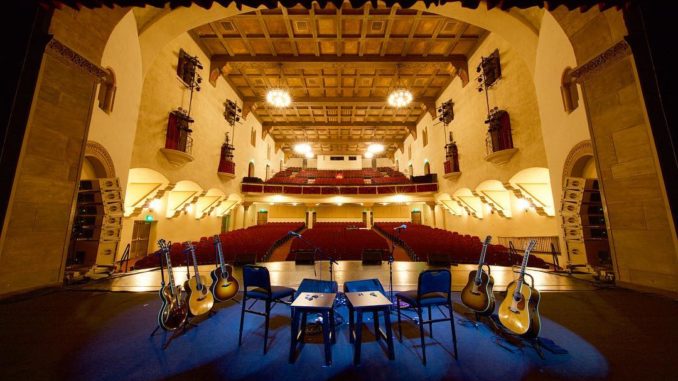
When Smokey the Groove hit the stage for its May 23 performance at Lost on Main, it had been the first gig in more than two months. Not just the first gig for the local psych/funk/jam band, but also the first show that any band had played on a Chico stage since Gov. Gavin Newsom’s shelter-in-place order was implemented on March 19.
Lost on Main General Manager Karin Williams introduced Smokey by saying, “Until we can all get back to live live music, enjoy this.” She was referring to the concert attended by an audience of camera operators and soundpeople inside the downtown club, and broadcast online via Facebook Live. With California’s nightclubs and concert venues closed until we reach the final stop on California’s “Resilience Roadmap”—aka stage 4 of reopening—the internet is the only venue where Chicoans can catch a live band.
The COVID-19 pandemic has wiped out the live music scene as Butte County knows it. It’s the same story in most cities in America, as musicians, venues and the workers who make the shows happen face an uncertain future in an industry that was among the first to be shut down and will be one of the last to return. The CN&R surveyed bookers and managers at local clubs, bars, cafes, galleries and concert halls to find out when the shows might return, what they’ll look like when they do, and how the community will be impacted.
Stephen Cummins, director of University Public Engagement at Chico State and booker of the school’s Chico Performances series at Laxson Auditorium, might’ve had the first coronavirus-related cancellation in Chico.
The GuGu Drum Group from Shanghai, China, was scheduled to play the second show of its American tour at Laxson on Feb. 4. In January, as the news of the looming pandemic spread, Cummins called the group’s agent and asked, “Can you tell me that none of [the performers] have been to Wuhan Province?” The agent could not.
This cancellation was prior to President Trump declaring a public health emergency and issuing travel restrictions for China, and more than a month before widespread cancellations of public events in this country.
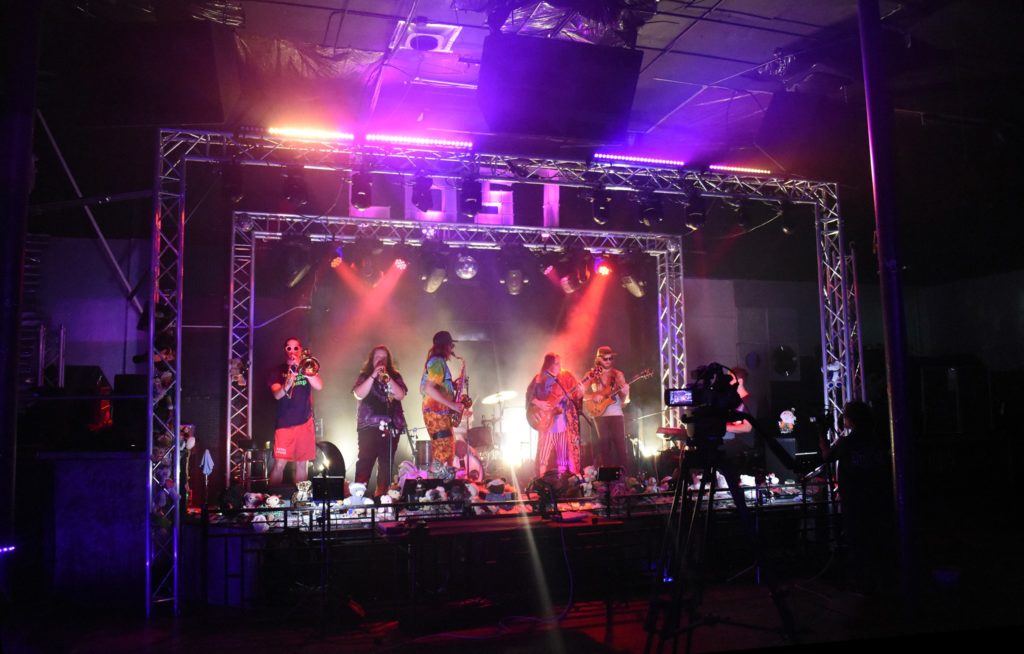
Smokey the Groove during a May 23 livestream performance from inside a closed Lost on Main. (Photo by Ken Pordes)
By mid-March, however, the writing was on the wall. As the pandemic spread, producers of large public gatherings—everything from concerts to sporting events—started postponing and canceling their shows. In conjunction with the university’s announcement of the suspension of in-person instruction on March 13, Cummins shut down the remainder of Chico Performances’ spring schedule. Since then, he’s also canceled all shows planned through Thanksgiving for the upcoming 2020-21 season.
“We will probably be more careful than some people,” Cummins said about bringing audiences back to Laxson, pointing out that institutions like the university are normally “risk adverse” in the first place, and unlike a privately owned club, he doesn’t have to worry about making the rent.
According to a survey conducted by the National Independent Venue Association (NIVA), 90 percent of its 2,000 members said their venues will be forced to close permanently in a few months if they don’t receive federal funding. Under the banner of the Save Our Stages campaign, NIVA is lobbying Congress for expanded benefits under the Paycheck Protection Program, as well as a host of tax breaks for the industry that currently has virtually no revenue.
“We refunded almost a million dollars in ticket sales [in the first month of the pandemic],” said Justin Maximov, owner of JMax Productions, the Chico company that books concerts for the Senator Theatre (as well at venues in Nevada and southern Oregon). After rescheduling some concerts multiple times, Maximov stopped selling shows and holding dates for touring acts. “I don’t think we’re going to have anything until the beginning of next year,” he estimated. “I’ve been doing this for 30 years. I don’t have a back-up plan.”
Of the 15 Butte County venues contacted by the CN&R, 11 of them (mostly bars and restaurants with existing means of earning money) said they could make it without live music or government assistance. Continued existence for the rest is dependent on the return of shows or receiving financial help (two reported being turned down for federal loans and one received a modest Economic Injury Disaster Loan).
More than half of the venues have canceled events indefinitely (with the exception of a handful of brunch/happy hour sets by solo acts physically distant from patrons), and the projected return for the rest is somewhere between this fall and spring/summer of 2021.
“In my head, I don’t see a return to normalcy until this time next year,” said Jake Sprecher, booker for Duffy’s Tavern. He also produces the annual multi-venue Valley Fever music festival, which was slated for April and was forced to postpone until next spring/summer at the earliest.
What “normal” will look like is hard to determine at this juncture. No matter when Butte County venues are allowed to reopen, guidelines for physical distancing and crowd control will come with economic and logistical impacts.
“Am I all of a sudden going to have another $1,000 to $2,000 in expenses?” Maximov wondered as he penciled out plexiglass barriers and extra staffing for line management coupled with reduced revenue from fewer patrons. “I don’t know what it’s going to cost me to put on a show anymore.”
As for Duffy’s, a bar with limited space to begin with, if the stage area is cleared of tables for a performance, that further limits seating in a place that’s already been required to increase spacing. “If you don’t have those tables full, you just lost 20 percent of your capacity,” added Sprecher. “All of a sudden the bar is making that much less money.”
For Cummins at Chico State, logistics will be most challenging. “It’s not the theater houses [that are the problem]; it’s the size of the restrooms, and the size of the lobby, and our ability to queue people,” he said. “Just seating the audience socially distanced is probably the easiest thing in the equation.”
There’s also the matter of when the touring bands will return. Not only will many bookings be months away, but if venues in major cities like Portland and San Francisco—along the tour routes that feed into Chico—are forced to close down, tours will pass on our little city.
“It really affects a market like Chico,” said Mahina Gannet, manager of the Big Room at Sierra Nevada Brewing Co. “It’s along the way, and it works out really well for a lot of touring artists if those other venues exist. So many iconic venues might have to shut their doors forever, and it’s so heartbreaking to think about.”
“I think the economic impact will be profound,” Cummins said when looking at the bigger picture. “I talk to the restaurateurs downtown and they all know the Chico Performances schedule, because they have to put extra waiters on that night.”
Arts and music venues are a significant source of employment and revenue. The latest report from the U.S. Bureau of Economic Analysis found that “arts and culture contributed $877.8 billion, or 4.5 percent, to the nation’s gross domestic product in 2017.”
“It’s not just the ticket revenue,” Cummins stressed. “There’s so much more that’s coming back to the community, [including] our way of life, the little bit of beauty by getting to hear a singer-songwriter. There’s just the fact that the arts are transformative. And god, our society needs transformative experiences right now more than any other time.”

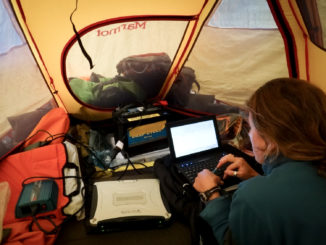
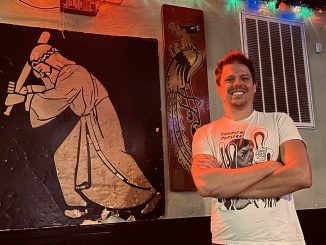
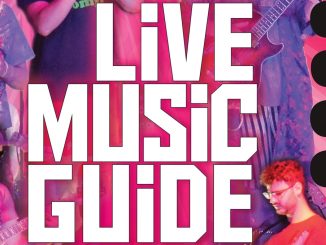
In addition to the logistical and financial difficulties for the venues, a large percentage of potential patrons will be too fearful to attend any musical events.
Thank you, Stephen Cummins, for your forethought and awareness. You may have protected Chico from an early surge in the virus.